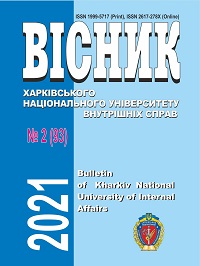Basic Evolutionary Stages of Polish Democracy
Abstract
The article is focused on studying and scientific understanding of the process of the formation and evolution of Poland as a modern democratic European state. The author has indicated the significance of the influence of the democratic traditions of the Polish people on the formation of the current model of the state system of the Republic of Poland.
The author has established the general chronological boundaries of each of the periods of democratization of Polish society starting from the times of “noble democracy”. The main characteristics of the stages of democratic development of Poland until the present day have been determined.
The main factors that influenced the course of democratic transit in the Polish state have been clarified. It has been proved that the peculiarities of modern Polish statehood are determined by the historical traditions of Polish democracy, the mentality of the Polish people and membership in the European Union and other international organizations. It has been emphasized that the implementation of economic and institutional transformations in Poland in the post-Soviet period was accompanied by the simultaneous formation of civil society. It has been established that the result of democratic transit in the Republic of Poland is a liberal democracy of the Western type with a certain bias towards social democracy.
The author has emphasized the decisive role of European integration processes in the formation of the Republic of Poland as a democratic, legal and social state. Based on the analysis of the current legislation and ongoing reforms in the law-making sphere, the author has defined the main factors that determine the existing systemic threats to the rule of law and democracy in Poland at the present stage of its state-building.
It has been stated that although Polish democracy demonstrates some negative tendencies, it is unlikely collapsed due to the current challenges, since the Republic still maintains the balance between state power and political freedom of citizens and their associations and the general atmosphere in Polish society remains open and free.
Downloads
References
Mendzhetskyi V. and Ratsysevych Ye. (eds), 2015. Poland – the historical sketch [Polshcha – narys istorii]. Warsaw.
Marchuk M.I., 2014. Territorial self-government in the Polish-Lithuanian Commonwealth [Terytorialne samovriaduvannia u Rechi Pospolytii]. Pravo bezpeka, No. 4, pp. 21-28.
Antoszewski A., 2013. Funkcje parlamentów państw Europy Środkowej i Wschodniej jako przedmiot badań politologicznych. In: Sulowski S. and Szymanek J. (eds). Ustrój polityczny państwa. Polska, Europa, świat. Warszawa: Kancelaria Sejmu. S. 214–215.
Turchak O.V., 2008. The state system of Poland under the March Constitution of 1921 [Derzhavnyi ustrii Polshchi za Bereznevoiu Konstytutsiieiu 1921 r.]. Naukovij vìsnik Lʹvìvsʹkogo deržavnogo unìversitetu vnutrìšnìh sprav. Serìâ ûridična – Scientific Bulletin of Lviv State University of Internal Affairs. Juridical Series, Iss. 2, pp. 42-53.
Wroczyński K., 1994. Demokratyczne państwo prawne. Człowiek w kulturze, Nr. 3, s. 151-160.
Haidanka Ye., 2014. The social dynamics of democracy consolidation in Poland: an institutional dimension [Suspilna dynamika konsolidatsii demokratii v Polshchi: instytutsiinyi vymir]. In: Lendel M., Palinchak M. and Striapko A. (eds). Uzhhorod Polish scientific readings: history, culture, politics, law [Uzhhorodski polski naukovi chytannia: istoriia, kultura, polityka, pravo]. Uzhhorod: Lira. Pp. 94-100.
Haidanka Ye.I., 2012. Economic aspects of the democratization model of Central and Eastern European countries (using the examples of Poland, Hungary and Slovakia) [Ekonomichni aspekty modeli demokratyzatsii krain Tsentralno-Skhidnoi Yevropy (na prykladi Polshchi, Uhorshchyny ta Slovachchyny)]. In: Zakharchenko P.V. and Nestorenko T.P. (eds). Spatial economics: concepts, models and regional aspects [Prostorova ekonomika: kontseptsii, modeli ta rehionalni aspekty]. Berdiansk: Vydavets Tkachuk. Pp. 227-237.
Larin M., 2005. Poland in the EU: the first experience [Polshcha v YeS: pershyi dosvid]. Ûridičnij vìsnik Ukraïni, No. 13, p. 11.
Lebedeva T.P., 2004. Liberal democracy as a reference point for post-totalitarian transformations [Lyberalnaya demokratiya kak oriyentir dlya posttotalitarnykh preobrazovanii]. Polis, No. 2, pp. 76-84. https://doi.org/10.17976/jpps/2004.02.08.
Makovskyi S.O., 2011. The evolution of Poland’s participation in the European Union international politics [Evoliutsiia uchasti Polshchi v mizhnarodnii politytsi Yevropeiskoho Soiuzu]. Aktualʹnì problemi mìžnarodnih vìdnosin – Actual Problems of International Relations, Iss. 101, part 1, pp. 62-72.
Demianenko M., 2018. Recent trends in the relationship between Poland, Hungary and the Czech Republic with the EU: causes of aggravation and expectations [Ostanni tendentsii vzaiemovidnosyn Polshchi, Uhorshchyny i Chekhii z YeS: prychyny zahostrennia ta prohnozy]. Ukraina: podii, fakty, komentari, No. 2, pp. 21-29.
Palas N., 2009. Transnational model of democracy and its impact on the global governance in the context of today’s world [Transnatsionalna model demokratii ta yii vplyv na protsesy hlobalnoho vriaduvannia v umovakh suchasnoho svitu]. Ukrainska natsionalna ideia: realii ta perspektyvy rozvytku, Iss. 21, pp. 145-150.
Copyright (c) 2021 M. I. Marchuk

This work is licensed under a Creative Commons Attribution 4.0 International License.




